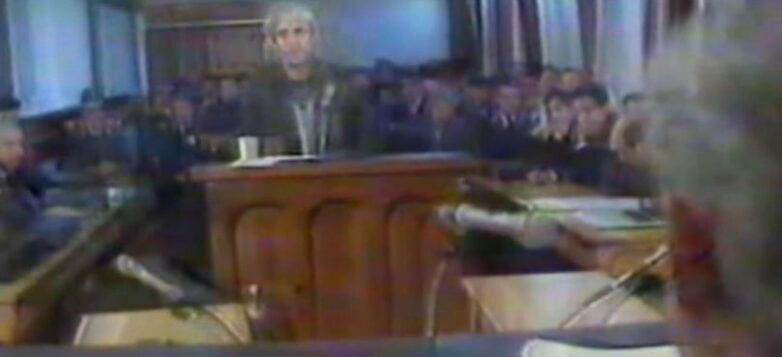Suçlama çok ağırdı. Dedim ki, daha önce sohbet sırasında söyledim, infaz için on üç kararımız var, onları okudum ve kararlar hala bir yerde duruyor. ‘Cezayı hafifletme şansı yok’ dediler. O zaman Arnavut bir yönetmen vardı, Şera, Şerafedin Ajeti. […] Belgrad’a gönderilen 14 kişilik gruptan tek kişi bendim. Niye? Avukatım geldi, avukatım Adem Vokshi’ydi, ‘Durum nasıl avukat?’ dedim. ‘Eh, Ibush dediler, ikisi ruhsuz, biri kafasız’ dedi. Ama daha fazla konuşmaya da cesaret edemedi, hücrede, hapishanenin o koridorlarında, her şey gözetleniyordu.
Ve şöyle bir işaret verdi {etrafına bakar}… dedi ki, ‘122 tanık’ dedi, ‘aleyhinize tanıklık etti’ dedi, ‘ve tanıkların ifadesi’ dedi, ‘onları getirip okuyabilirim’ dedi, ‘korkunçlar.’ Yani Ibush izin vermeseydi kimsenin madenin içine giremeyeceğine tanıklık ettiklerini söyledim. Bu çok ciddi bir tanıklıktı, bu yüzden tüm sorumluluğu bana attılar. ‘Ama, göreceğiz’ dedi. Biri, çalışmayan bir Sırp tanıklık etti, “Hayır, grevin organizasyonu ne kelime, madencilerin ayakkabı numaralarını bile biliyor.
Ibush Jonuzi 1950 yılında Vushtrri Belediyesine bağlı Pasoma köyünde doğdu. 1973 yılında Mitrovica’da Boris Kidrić Yüksek Teknik Okulu’nu bitirdi. Aynı yıl Bay Jonuzi, Stari Trg’deki Trepça’da yoğunlaştırma madeninde çalışıyordu. 1989 yılında hapsedilene kadar, Bay Jonuzi, Trepça’da teknik direktör olarak çalıştı. 1992’de İbrahim Rugova liderliğindeki hükümette milletvekili seçildi. 2014 yılında ise emekli olana kadar müdür yardımcısı olarak çalıştığı Trepça’ya geri döndü. Bay Jonuzi şimdi ailesiyle birlikte Vushtrri’de yaşıyor.
